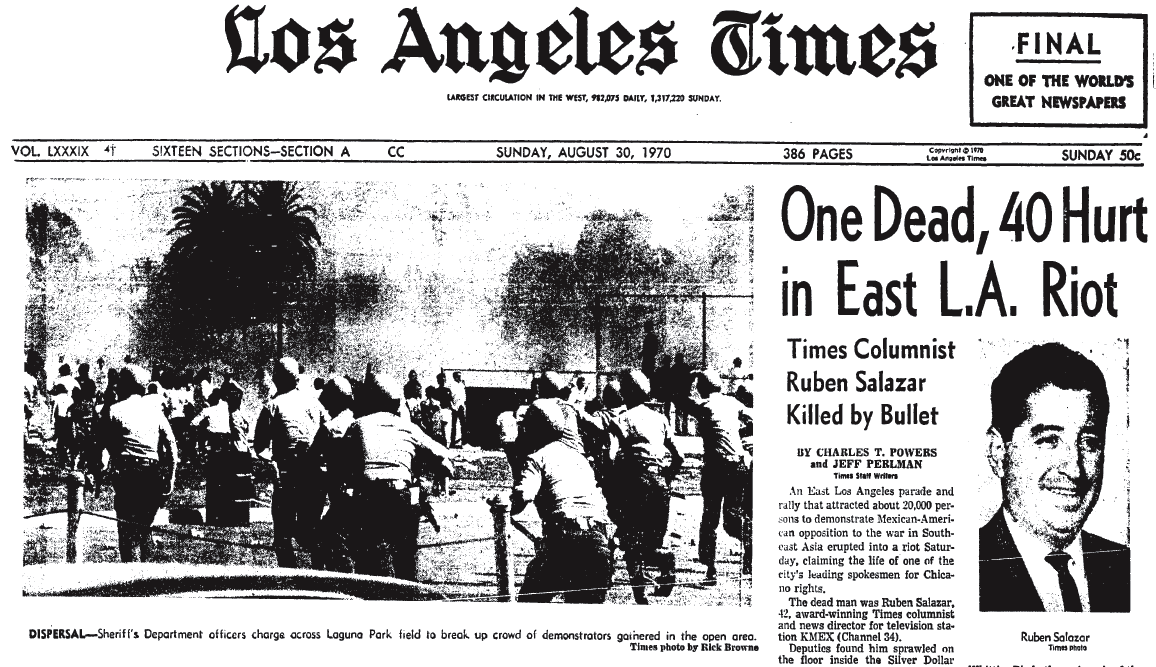

Share
Every winter I take advantage of the holiday period to visit family and friends on the west coast. Much to my excitement there happened to be a series of exhibits in various institutions on Latin American culture and its impact on Southern California. The effort is entitled, “There Will be Borders Crossed. There Will be Art.”
The exhibits brought me to a deep reflection over the arch of my life as a working-class Chicano from Los Angeles preparing enthusiastically to come back to freezing temperatures to be the Editor of Workday Minnesota. With journalism on my mind, I made my way to the Autry Museum of the American West for the exhibit “La Raza.” According to the museum the exhibit “explores how bilingual newspaper La Raza provided a voice to the Chicano Rights Movement, positioning photography not only as an artistic medium but also as a powerful tool of social activism.”
The La Raza newspaper (1967-77) was a publication that spoke truth during a tense time for Chicanos in Southern California amid the broader civil rights movement. In particular, the photos taken were a means of accountability as the Los Angeles Police and Los Angeles County Sheriff’s increased their campaign of terror against my community. I had never heard of La Raza and was astounded and moved by the images. In particular, the controversial murder of path-breaking journalist Ruben Salazar featured in the exhibit held my attention.
Salazar was the first Chicano columnist for a major U.S. newspaper and was noted for his ability to thoughtfully represent the experiences of a community in protest. Salazar was under greater scrutiny by the LAPD following articles critical of their tactics and coverage of the murder by police of two Chicano youth. The official story is that on August 29, 1970, while taking a break at the Silver Dollar Bar and Café, Salazar was shot by an errant 10-inch-long tear-gas projectile fired by a Los Angeles Sheriff’s deputy. The police were active in response to the Chicano Moratorium antiwar protest that had taken place earlier that day.
My father told me stories of Salazar when I was young. My father had a particular way of telling stories that captivated his friends and me. My memories of his reflections over Salazar captured my attention and created another layer of affection for the exhibit. He would regularly read the local Spanish language newspaper, La Opinion. When he thought a particular article from his favorite columnist would be of interest to me, he would carefully cut it out with an Exacto knife and laminate it to preserve it while patiently waiting for me to come home from college. He would then read the column aloud, provoking discussion and reflection between us. I write because I saw through him the impact that good writing and journalism can have as it expanded his mind and brought us into a collective conversation about what was affecting us.
Once when I came home, I interviewed my dad for an oral history project. Hoping that his storytelling prowess would emerge along with his careful reflection on prior articles I was surprised that he had nothing to say. He immediately looked at me with apprehension and in Spanish asked, “Why me?” As he would explain, he did not think that his perspective was relevant or even mattered. My father’s denial of his presence in the world is why I write. Working people like my father matter and their stories and experiences deserve to be in dialogue with how we understand our world.
I also believe that this is what Workday Minnesota is all about. As reporting on Workday has highlighted, the weakening of organized labor has led to eroding working conditions. Unions have confronted persistent and pervasive attacks from well funded ideological driven groups culminating in state-level right to work laws and the Supreme Court case Janus vs. AFSCME. This case is designed to turn back long-standing legal precedent and intensely undermine, if not destroy, public sector unions.
The result is that more and more workers are in low paid and tenuous employment. Despite being out of reach of unions, workers are nevertheless organizing and fighting. How everyday people with limited legal protections assert their presence and dignity will be a significant focus of our reporting. Our longstanding reporting on the activities and victories of unions will remain as foundational to our work as ever. You can also look forward reporting on incarcerated workers and the impact of the Super Bowl.
Our reporting will be distinctive because of the changing media landscape. As the media consolidates in the interest of narrow ideologies or deliberate misinforming, independent, rigorous journalism is essential now more than ever. We will do our best to meet that challenge for the workers that we cover and our audience.
Lastly, in thinking about Ruben Salazar among others and my role as a journalist, I am grounded in the understanding that the heritage of a writer of color is grounded in resistance and often met with violence. Our vocation is rooted in the defiance necessary to tell the stories of our communities. It never has been easy and will continue to be challenging.
I look forward to your support, interest, commentary, and engagement.
In Solidarity,
Filiberto Nolasco Gomez

